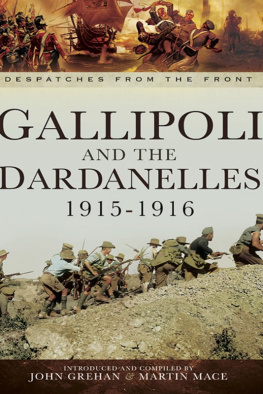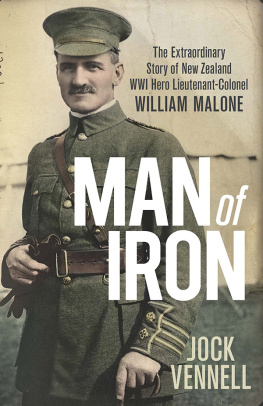This edition is published by PICKLE PARTNERS PUBLISHINGwww.picklepartnerspublishing.com
To join our mailing list for new titles or for issues with our books picklepublishing@gmail.com
Or on Facebook
Text originally published in 2003 under the same title.
Pickle Partners Publishing 2014, all rights reserved. No part of this publication may be reproduced, stored in a retrieval system or transmitted by any means, electrical, mechanical or otherwise without the written permission of the copyright holder.
Publishers Note
Although in most cases we have retained the Authors original spelling and grammar to authentically reproduce the work of the Author and the original intent of such material, some additional notes and clarifications have been added for the modern readers benefit.
We have also made every effort to include all maps and illustrations of the original edition the limitations of formatting do not allow of including larger maps, we will upload as many of these maps as possible.
WHY GALLIPOLI MATTERS: INTERPRETING DIFFERENT LESSONS FROM HISTORY
by
Lieutenant Colonel John M. Sullivan Jr USMC
Abstract
After careful study of the Gallipoli Campaign of 1915, why did the British and the Americans come up to contradictory operational conclusions regarding the future applicability of amphibious operations? Divergent views from the lessons of Gallipoli campaign are the result of three differing operational approaches to strategic considerations that Britain and the Unites States faced in the 1920s and 1930s. The first were different theater strategic objectives that required different operational campaigns necessary to achieve each. The second was different operational experiences, which caused one side to focus on the past while the other to the future. The final was the different means available to operational commanders to execute their campaign.
History can often provide contradictory lessons to those who wish to use it to practically apply operational art. Using analogies correctly is important. For the operational commander, drawing the correct lessons learned is made even more difficult by the very nature of inter-service rivalry. Derived from an analysis of the operational art and at operational level of war, the lessons learned from this campaign led directly to the development of sound doctrine, which developed in peacetime was absolutely essential in wartime. Finally, we continue to learn from failure more often than through success, but we must not allow ourselves to be intimidated by failure either.
Introduction
Do we really need another study on the British landings upon the Gallipoli peninsula in 1915? After all, the landings and subsequent campaign were studied in detail during the 1920s and 1930s in British and American staff colleges, each searching for clues and lessons learned. The very word Gallipoli conjures up visions of amphibious assault and failure of what might have been. Yet, studied as it was, the Gallipoli campaign, its lessons and effects, meant many different things to many different military officers. Why then, after studying the Gallipoli Campaign, did the British and the Americans come to contradictory operational conclusions regarding the future applicability and doctrine of amphibious operations?
In this paper I plan to demonstrate that the divergent or contradictory views from the lessons of the Gallipoli campaign are the result of three differing operational approaches to strategic considerations facing Britain and the United States in the 1920s and 1930s. The first was differing theater strategic objectives requiring different operational campaigns necessary to achieve each. The second was differing operational experiences, causing one side to focus on the past while the other to the future. The third was the differing means available to operational commanders to execute their campaign. Finally, the Gallipoli campaign and its lessons demonstrate the seductiveness of what appears to be a good analogy. All of this is central to how an operational commander derives and interprets lessons learned from past operations or historical case studies, whether for future operations, or recommendations for joint force or service competencies.
Background
The Gallipoli Campaign of 1915 originated in a brilliant attempt to break the stalemate on the Western Front by knocking Turkey out of the war and to shore up a Russian ally by opening up a route of supply through the Dardanelles and Black Sea. It was to be the first amphibious assault in modern history and a campaign that was to have lasting effects on the future of amphibious operations. {1}
Gallipoli provided future amphibious warfare theorists outstanding lessons in operational art on how not to conduct amphibious operations. From the start of the campaign, the lack of amphibious doctrine for modern warfare and a series of errors seriously hindered the expeditions possibility for success. A lack of forethought and planning was evident throughout the campaign. Despite its maritime heritage, Britain had made few preparations for amphibious operations in a modern war, and it showed at Gallipoli.
The Gallipoli campaign was fraught with last minute changes and required desperate ingenuity to get the whole thing underway. To make matters worse, insufficient and untrained troops were assigned to the landings, and subsequent reinforcements were piecemealed into the campaign. The lack of an operational reserve in the initial landings prevented the Army commander from reinforcing success at one or any of the beachheads. Troops and equipment were not combat-loaded when the expedition initially embarked for the invasion, which later required off load and re-embarkation in Egypt. With this delay, combined with a total lack of operations security, the element of operational surprise was lost between the Royal Navys first attempt to force the Dardanelles in March and the Armys initial landings in April. When the expedition sailed from Egypt to Gallipoli, few rehearsals were conducted prior to any amphibious operations in theater. {2}
As plans for the campaign progressed, matters did not improve. Cooperation between operational commanders left much to be desired; the Army and Navy commanders were not collocated, and the effort lacked unity of command. Unity of effort was further hampered by the fact that there was no joint objective for the operation. General Ian Hamilton, the Army commander, believed the attack would coincide with continued navy pressure in the Dardanelles; Admiral John de Robeck, the naval commander, decided not to attack until the Army was firmly established ashore. {3}
Despite the debacle and the resulting historical perception, the British did demonstrate some positive aspects of operational art in amphibious operations. In April 1915, they and their allies did not have numerical superiority over the Turkish defenders at Gallipoli. In fact, five British and ANZAC divisions faced six Turkish divisions on the peninsula. The numerically weaker British forces made brilliant use of an amphibious raid and two amphibious demonstrations to gain numerical advantage for their main and supporting attacks. These three maneuvers, which used only fifteen percent of the British forces, were able to delay the arrival of one-third of the Turkish defenders into the area of the main attack for twenty four hours. As a result, when surprise was achieved the landings incurred few casualties among the assault troops. {4}






